
The problem-plagued preparations for this year's 2014 World Cup in Brazil has been well chronicled, with critics condemning the range of issues from budget blowouts to construction delays. Protesters and Brazilian police clashed in the days before the first World Cup match was to be played in the city. The demonstrations in recent months have paled in comparison to those last year, when a million people took to the streets on a single night airing laments including the sorry state of Brazil's public services despite the heavy tax burden its citizens endure. Those protests were largely spontaneous and no single group organized them. Here is a look back on the tumultuous events leading up to the 2014 World Cup.
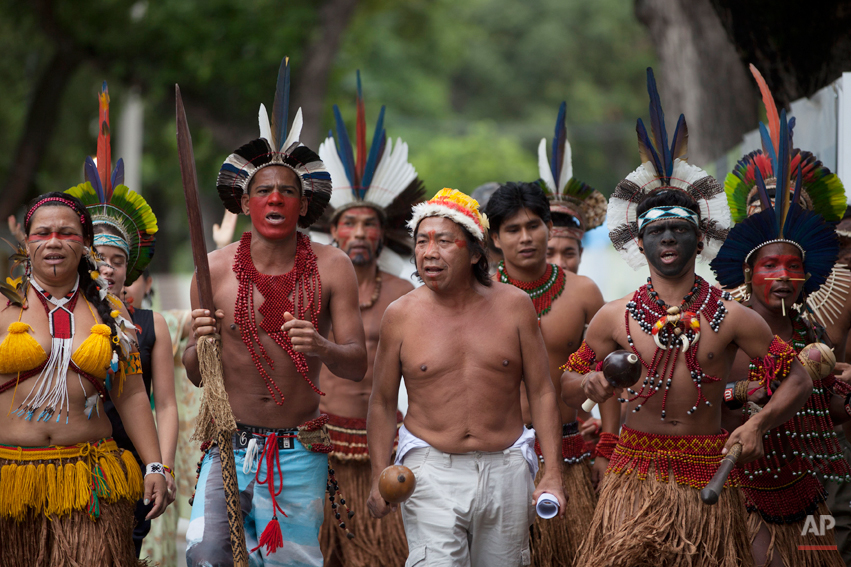
Brazil WCup Soccer Protest
Indigenous people from various tribes protest outside the Maracana stadium as sports officials visit the stadium in Rio de Janeiro, Brazil, Monday, Nov. 26, 2012. Indigenous leaders are fighting the destruction of the old Indian Museum set to be demolished as part of renovation on the Maracana stadium that will host next year's Confederations Cup and the World Cup soccer tournament in 2014. (AP Photo/Felipe Dana)
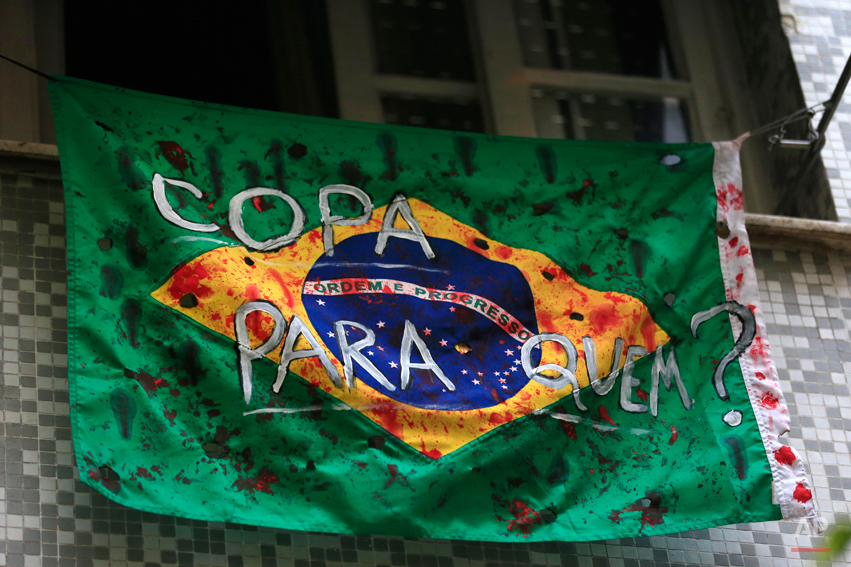
Brazil WCup Soccer Murals
A defaced Brazilian national flag hangs from a window of a house with a slogan that read in Portuguese, "Cup for whom?" in Rio de Janeiro, Brazil, Tuesday, May 20, 2014. As opening day for the World Cup approaches, people continue to stage protests, some about the billions of dollars spent on the World Cup at a time of social hardship, but soccer is still a unifying force. Brazil will host the World Cup soccer tournament starting on 12 June. (AP Photo/Hassan Ammar)
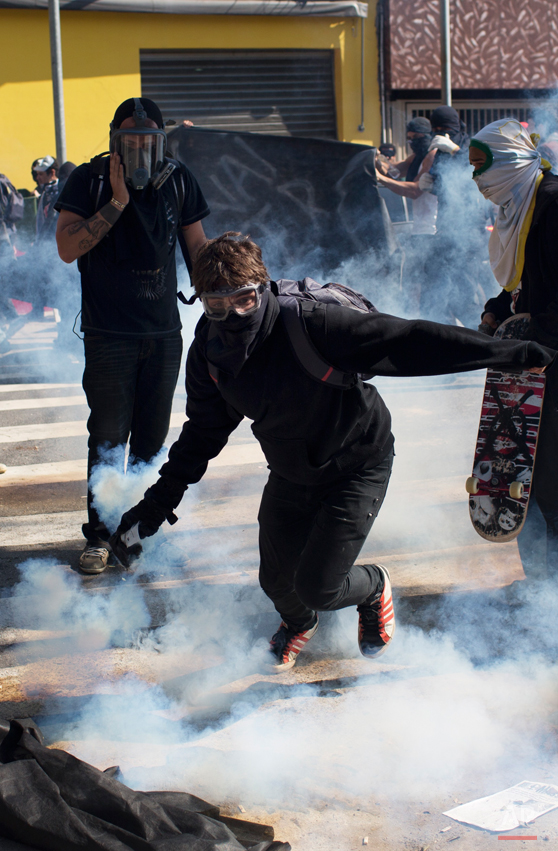
Brazil WCup Protests
A masked protester returns a tear gas canister to riot police during a demonstration by people demanding better public services and against the money spent on the World Cup soccer tournament in Sao Paulo, Brazil, Thursday, June 12, 2014. Brazilian police clashed with anti-World Cup protesters trying to block part of the main highway leading to the stadium that hosts the opening match of the tournament. (AP Photo/Rodrigo Abd)
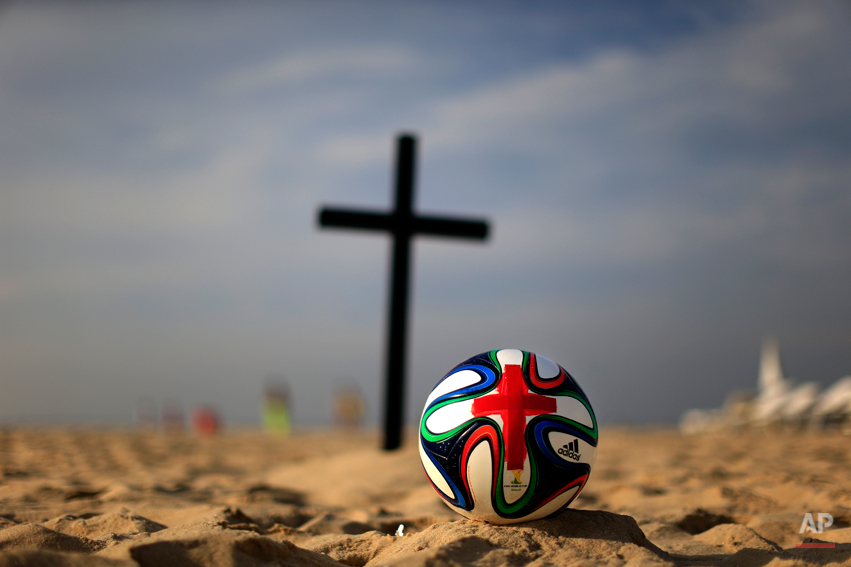
APTOPIX Brazil WCup Protest
The 2014 World Cup official soccer ball, called Brazuca, painted by protesters with a red cross and placed in front a cross, forms part of a tribute to children who have died from stray bullets during police operations, on Copacabana beach in Rio de Janeiro, Brazil, Wednesday, May 7, 2014. Organized by Rio de Paz, protesters say the money spent on World Cup preparations should have been used for the development of better schools, health care and improved security in shantytowns. (AP Photo/Hassan Ammar)
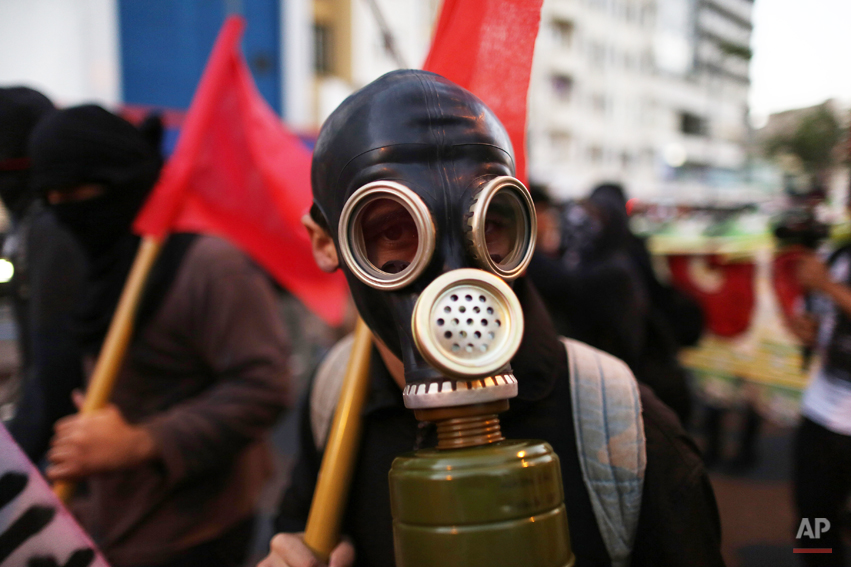
Brazil WCup Protests
An anti-World Cup demonstrator wearing a gas mask walks toward Maracana stadium during a protest demanding better public services and protesting the money Brazil spent on the international soccer tournament in Rio de Janeiro, Brazil, Sunday, June 15, 2014. (AP Photo/Leo Correa)
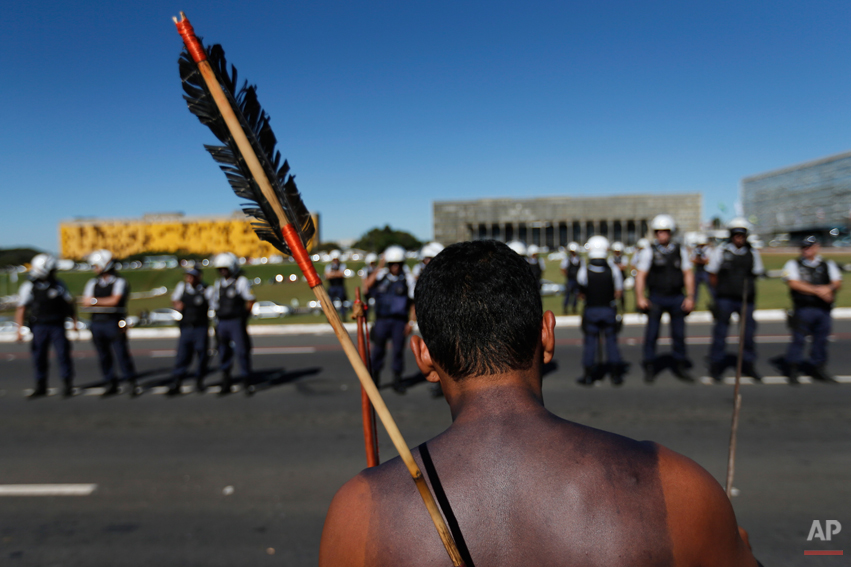
Brazil Protest
An Indian man, armed with a bow and arrow, stands before a cordon of riot police outside the Ministry of Justice, during a protest to demand the demarcation of indigenous lands in Brasilia, Brazil, Thursday, May 29, 2014. The indigenous protesters are demanding to meet with Justice Minister Eduardo Cardozo to discuss the reservation-reduction legislation. On Tuesday, the same Indians, demonstrating for the same reason, clashed with police resulting in one officer being shot in the leg with an arrow. (AP Photo/Eraldo Peres)
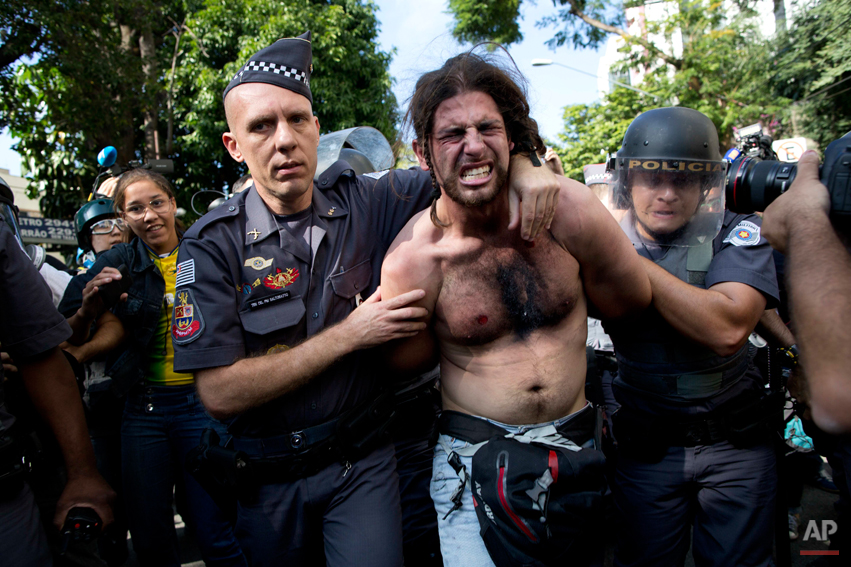
Brazil WCup Protests
A protester is detained by police during a demonstration demanding better public services and protesting the money spent on the World Cup soccer tournament in Sao Paulo, Brazil, Thursday, June 12, 2014. Brazilian police clashed with anti-World Cup protesters trying to block part of the main highway leading to the stadium that hosts the opening match of the tournament. (AP Photo/Rodrigo Abd)
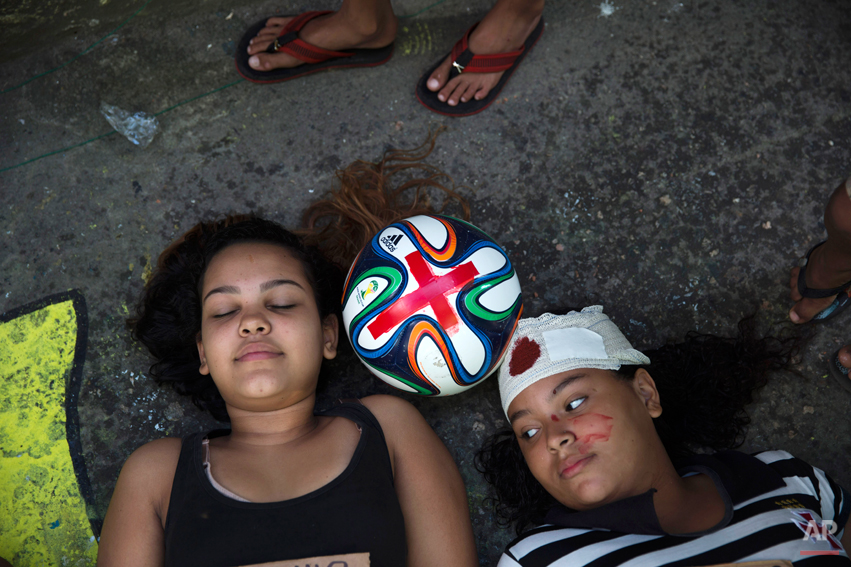
Brazil WCup Protest
Girls lie on the ground simulating a scene of a Brazilian public hospital emergency room during a protest against the public money spent on the preparations for the 2014 World Cup, at the Jacarezinho slum, in Rio de Janeiro, Brazil, Saturday, May 10, 2014. Organized by Rio de Paz, protesters say the money spent on preparations should have been used for the development of better schools, health care and improved security in shantytowns. Between the girls is a Brazuca, the 2014 World Cup official soccer ball, painted by protesters with a red cross. (AP Photo/Hassan Ammar)
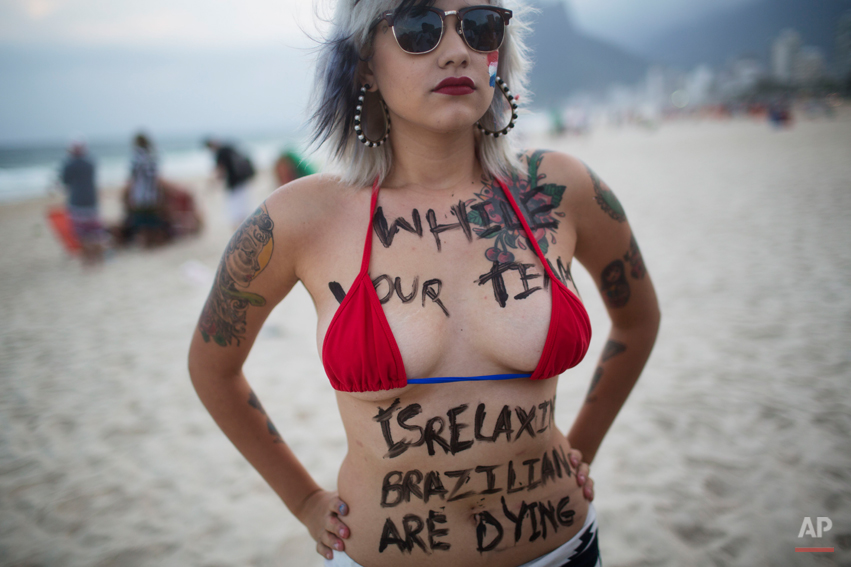
Brazil WCup Soccer
Activist Sara Winter poses for the picture during her anti World Cup protest in Rio de Janeiro's Ipanema beach, Brazil, Monday, June 9, 2014. Written on her body in English is the phrase, "While your team is relaxing, Brazilians are dying". Winter walks the beach talking to foreign tourists telling them that Brazilians are suffering from neglect. The FIFA 2014 soccer World Cup is set to open on June 12. (AP Photo/Rodrigo Abd)
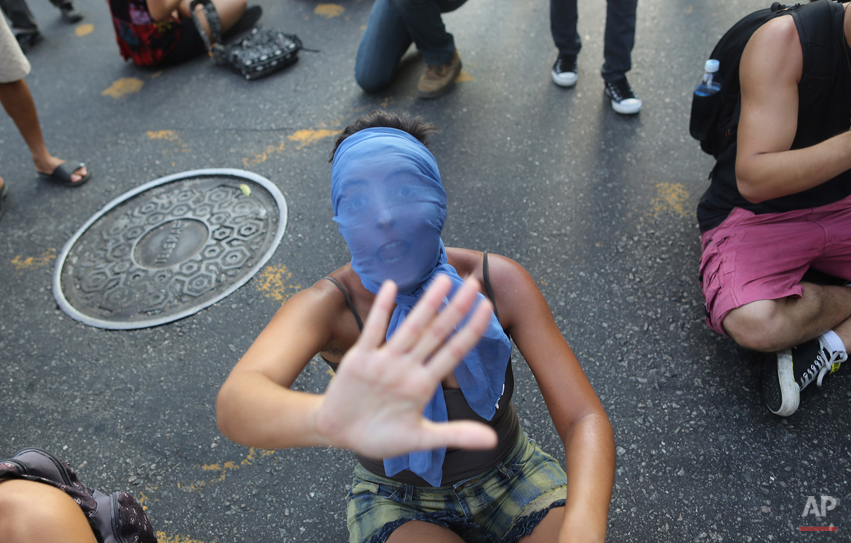
APTOPIX Brazil Protests
A masked girl shouts while sitting on the street, in protest against the increase on bus fares in Rio de Janeiro, Brazil, Monday, Feb. 10, 2014. Anti-government protests erupted across Brazil last June, hitting their peak as 1 million Brazilians took to streets on a single night, calling for better schools and health care and questioning the billions spent to host this year's World Cup and the 2016 Olympics. The protests have since diminished in size, but remain violent. (AP Photo/Leo Correa)
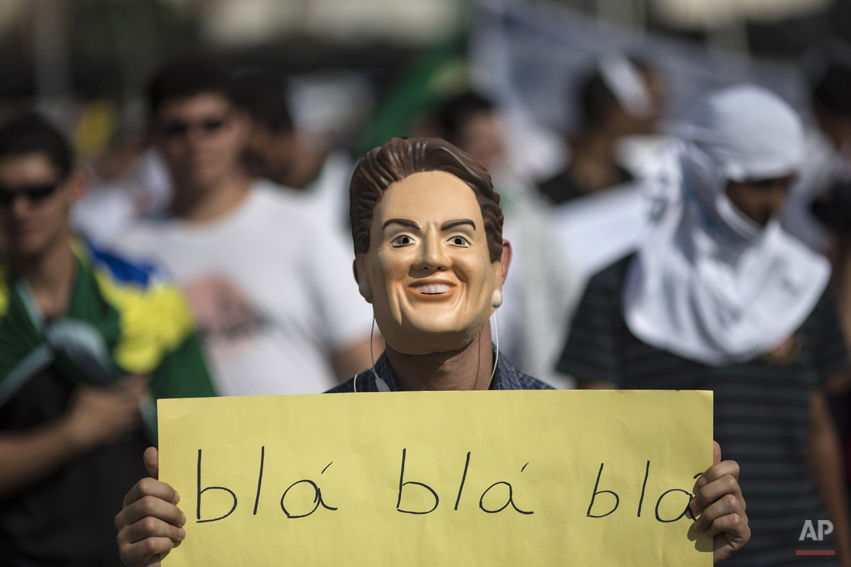
Brazil Confed Cup Protests Photo Gallery
A man wearing a mask depicting Brazilian President Dilma Rousseff, holds a banner criticizing her yesterday speech during a protest in Belo Horizonte, Brazil, Saturday, June 22, 2013. Demonstrators once again took to the streets of Brazil on Saturday, continuing a wave of protests that have shaken the nation and pushed the government to promise a crackdown on corruption and greater spending on social services. (AP Photo/Felipe Dana)
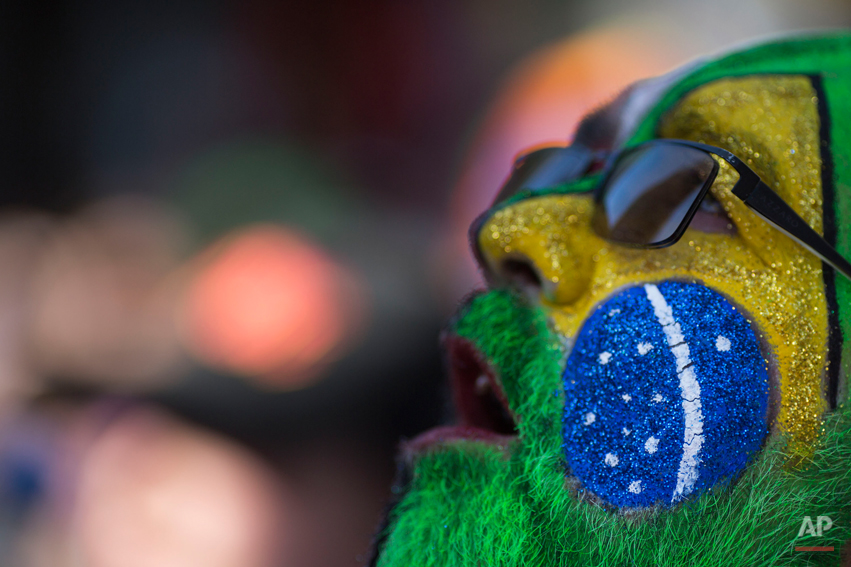
APTOPIX Brazil Confed Cup Protests
A demonstrator with the Brazilian flag painted on his face, shouts slogans during a march towards the Mineirao stadium as they protest before the soccer Confederations Cup semifinal match between Brazil and Uruguay in Belo Horizonte, Brazil, Wednesday, June 26, 2013. The wave of protests that hit Brazil on June 17 began as opposition to transportation fare hikes, then expanded to a list of causes including anger at high taxes, poor services and high World Cup spending, before coalescing around the issue of rampant government corruption. (AP Photo/Felipe Dana)
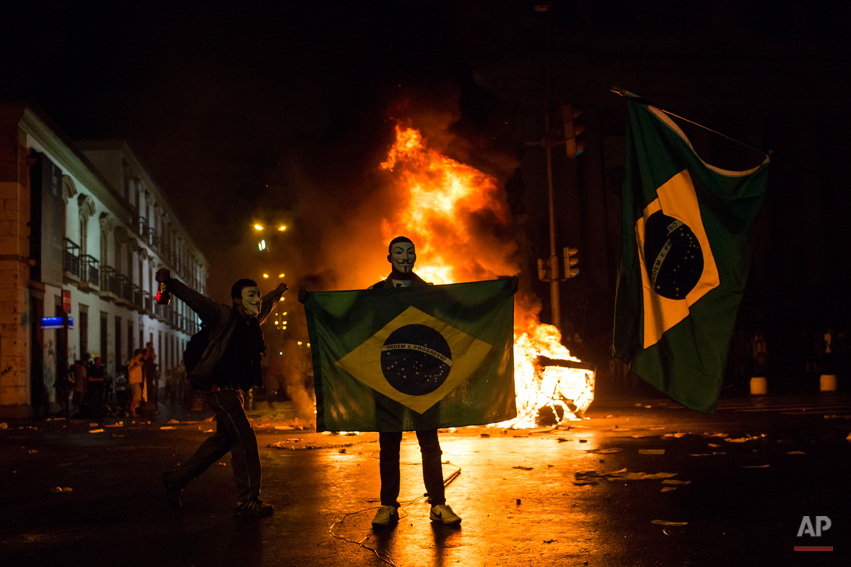
Brazil Confed Cup Protests
A demonstrator holds a Brazilian flag in front of a burning barricade during a protest in Rio de Janeiro in Rio de Janeiro, Brazil, Monday, June 17, 2013. Protesters massed in at least seven Brazilian cities Monday for another round of demonstrations voicing disgruntlement about life in the country, raising questions about security during big events like the current Confederations Cup and a papal visit next month. (AP Photo/Felipe Dana)
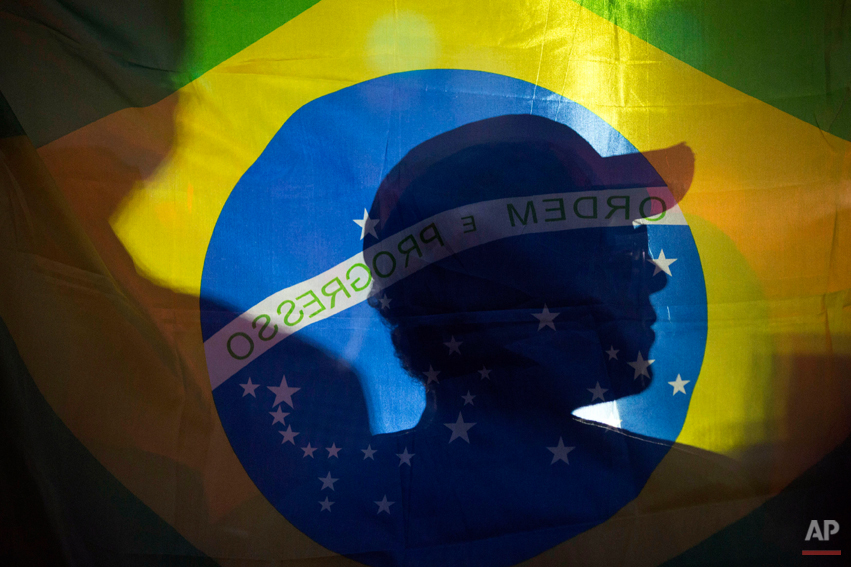
Brazil Confed Cup Protests
A man is silhouetted against a Brazilian flag during a protest in Rio de Janeiro, Brazil, Monday, June 24, 2013. Under pressure after more than a week of nationwide protests, Brazilian leader Dilma Rousseff said Monday her government will spend $23 billion more on public transportation and announced five core areas that leaders will focus on to speed political reform and improvements to government services. Rousseff made the announcement after meeting with leaders of a free-transit activist group that launched the first demonstrations more than a week ago and has called for new protests Tuesday.(AP Photo/Felipe Dana)
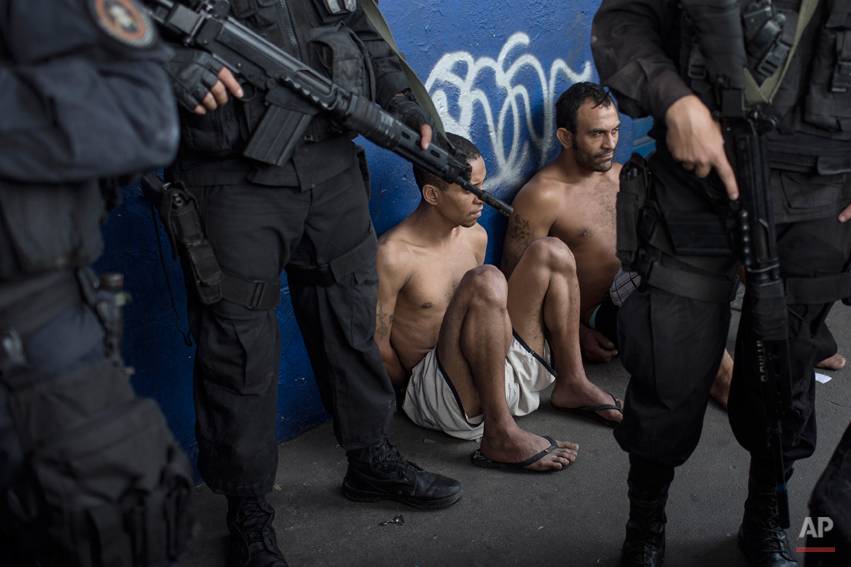
APTOPIX Brazil Confed Cup Protests
Suspects sit with their hands behind their backs after their arrest during a police operation in the Nova Holanda slum, part of the Complexo da Mare, in Rio de Janeiro, Tuesday, June 25, 2013. The police operation aimed to capture an alleged looter, who according to police killed an officer after a peaceful protest Monday night. At least seven people died and two suspects were captured during Tuesday's operation, according to police. (AP Photo/Felipe Dana)
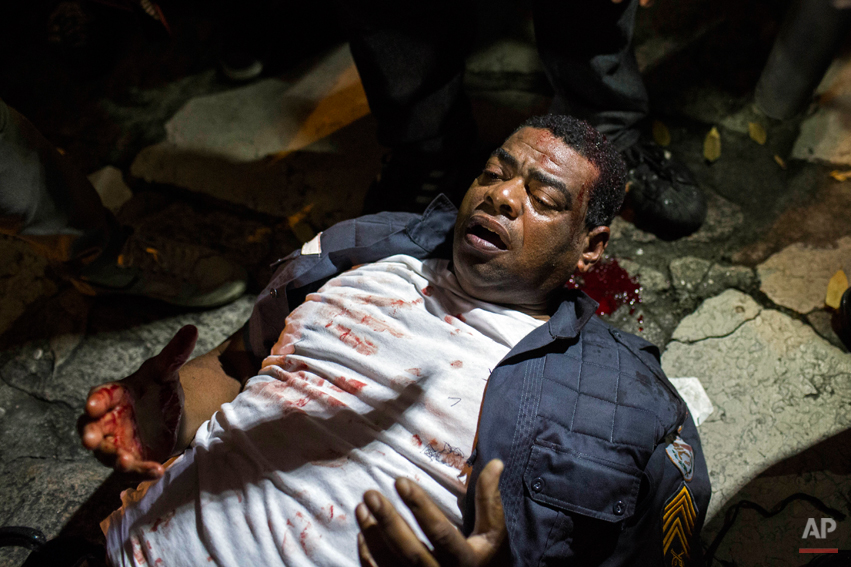
APTOPIX Brazil Confed Cup Protests
A policeman lies injured on the ground after clashing with demonstrators during a protest in Rio de Janeiro, Brazil, Monday, June 17, 2013. Officers in Rio fired tear gas and rubber bullets when a group of protesters invaded the state legislative assembly and threw rocks and flares at police as protesters massed in at least seven Brazilian cities Monday for another round of demonstrations voicing disgruntlement about life in the country, raising questions about security during big events like the current Confederations Cup and a papal visit next month. (AP Photo/Felipe Dana)
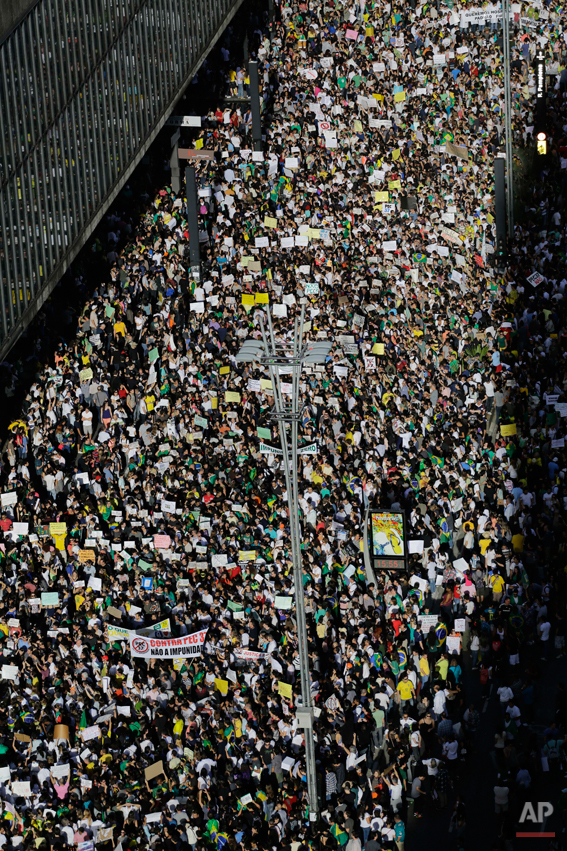
Brazil Confed Cup Protests
Demonstrators march in protest at Paulista Avenue in Sao Paulo, Brazil, Saturday, June 22, 2013. Demonstrators once again took to the streets of Brazil on Saturday, continuing a wave of protests that have shaken the nation and pushed the government to promise a crackdown on corruption and greater spending on social services. (AP Photo/Nelson Antoine)
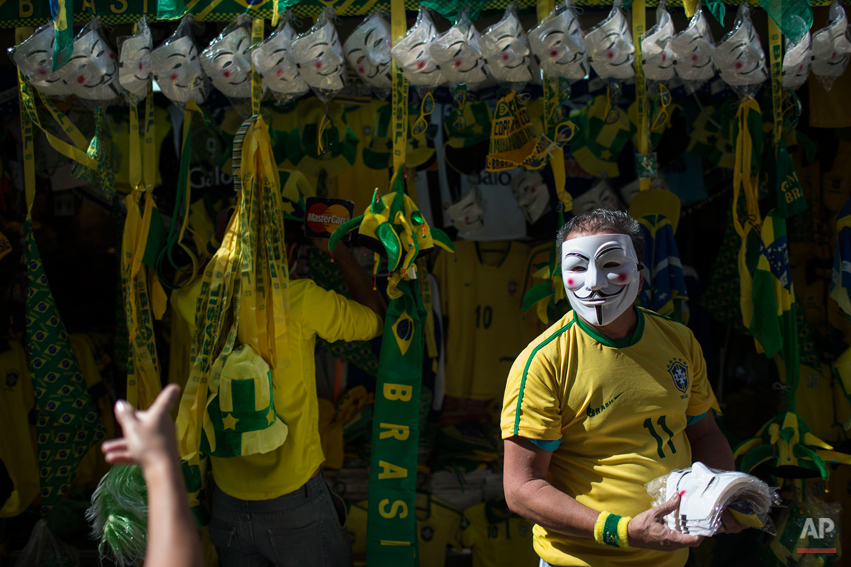
APTOPIX Brazil Confed Cup Protests
A vendor sells Guy Fawkes masks and Brazilian flags on the sidelines of a protest march moving toward the Mineirao stadium before a Confederations Cup semifinal soccer match between Brazil and Uruguay in Belo Horizonte, Brazil, Wednesday, June 26, 2013. The wave of protests that hit Brazil on June 17 began as opposition to transportation fare hikes, then expanded to a list of causes including anger at high taxes, poor services and high World Cup spending, before coalescing around the issue of rampant government corruption. (AP Photo/Felipe Dana)
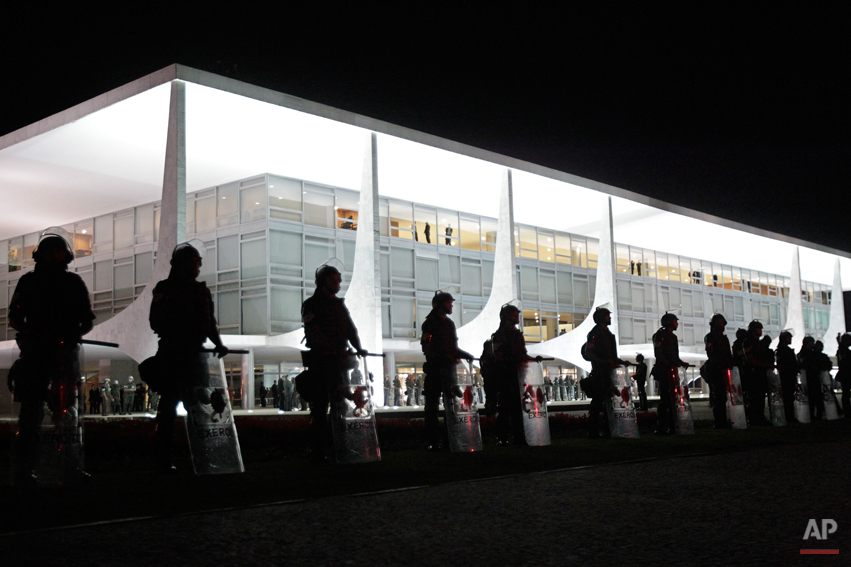
Brazil Soccer Confed Cup Protests
Army soldiers stand guard in defense of the Presidential Palace during a protest in Brasilia, Brazil, Thursday, June 20, 2013. More than half a million Brazilians poured into the streets of at least 80 Brazilian cities Thursday in demonstrations that saw violent clashes and renewed calls for an end to government corruption and demands for better public services. (AP Photo/Eraldo Peres)
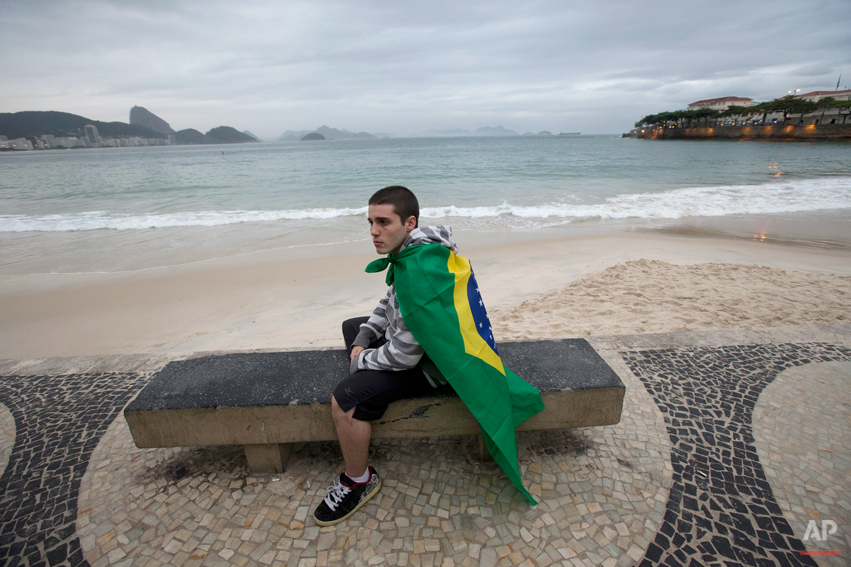
APTOPIX Brazil Confed Cup Protests
A demonstrator wearing a Brazilian flag on his back sits on a bench in Copacabana during a protest in Rio de Janeiro, Brazil, Sunday, June 23, 2013. Demonstrators continued Sunday a wave of protests that have shaken the nation and pushed the government to promise a crackdown on corruption and greater spending on social services.(AP Photo/Silvia Izquierdo)
Lead Image Caption: Protesters set on fire a FIFA World Cup magazine during a protest against the money spent on the World Cup preparations, in Rio de Janeiro, Brazil, Thursday, May 15, 2014. Protesters and police clashed in Rio de Janeiro Thursday, as demonstrations against the World Cup and rallies calling for improved public services erupted in several Brazilian cities. (AP Photo/Hassan Ammar)
About AP Images: AP Images is the world’s largest collection of historical and contemporary photos. AP Images provides instant access to AP’s iconic photos and adds new content every minute of every day from every corner of the world, making it an essential source of photos and graphics for professional image buyers and commercial customers. Whether your needs are for editorial, commercial, or personal use, AP Images has the content and the expert sales team to fulfill your image requirements. Visit apimages.com to learn more.
AP Images on Twitter | AP Images on Facebook | AP Images on Google+
Visual artist and Journalist





